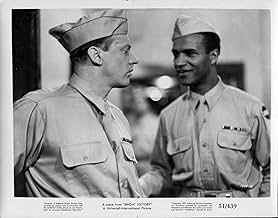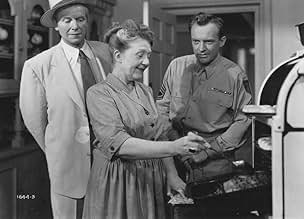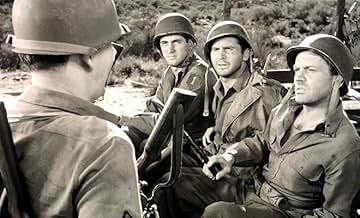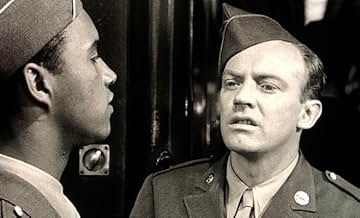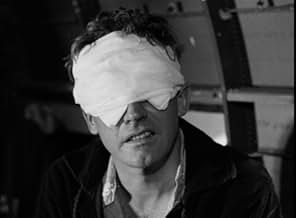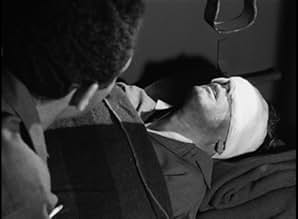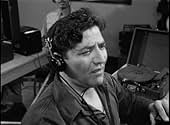VALUTAZIONE IMDb
7,3/10
1104
LA TUA VALUTAZIONE
Aggiungi una trama nella tua linguaAfter he gets blinded by a German sniper's bullet in 1943, Sergeant Larry Nevins begins the long and painful road to recovery.After he gets blinded by a German sniper's bullet in 1943, Sergeant Larry Nevins begins the long and painful road to recovery.After he gets blinded by a German sniper's bullet in 1943, Sergeant Larry Nevins begins the long and painful road to recovery.
- Candidato a 2 Oscar
- 5 vittorie e 6 candidature totali
Julie Adams
- Chris Paterson
- (as Julia Adams)
Recensioni in evidenza
Reminds me more of Pride of the Marines than Best Years of Their Lives. Blinded returning vet has to readjust. Arthur Kennedy never was better than in this movie. The ending in this cynical age seems too upbeat, but such endings DID happen. See: The Men with Brando for another crippled returning vet film.
I stumbled upon this excellent and compelling film during AMC's "Veterans' Day Movie Marathon." Dealing with a soldier's (Arthur Kennedy) rehabilitation after losing his sight during WWII in surprisingly frank ways for its time (released in 1951), this seems to me to be the first time I saw raw racism and its consequences in a film. A superb love story on the surface, it's the underlying themes of classism, racism and realistically dealing with the handicapped which set it a notch above the terrific 1946 film, "The Best Years of our Lives." Face it, Harold Russell, while a hero, was no actor. The electricity between Kennedy and his new "friend" (played by Peggy Dow ~ whatever became of this talented actress? Her career lasted only 4 years) is remarkable. Happy ending doesn't detract.
Arthur Kennedy is Larry, a man blinded in WW II battle in "Bright Victory," a 1951 film that also stars Peggy Dow, Julia Adams, James Edwards, Will Geer, Jim Backus, and Larry Keating.
Kennedy plays a southern racist whose life plan of marrying his high school sweetheart (Adams) and joining her wealthy father's business comes into doubt when he is shot and his optic nerve shattered during combat.
The film takes the viewer through Larry's training with other blind soldiers as he learns to adjust to a sightless life. One of the men, Joe (Edwards) is black and is his best buddy until Larry makes a bigoted remark (and uses the n word for extra emphasis).
A fellow soldier points out to him that from now on, he probably won't want to ask someone's race and religion before deciding if they pass muster. This sets Larry thinking.
He meets a sympathetic young woman, Judy (Dow), who falls for him but has to let him go home to the life he has there. But when Larry returns to his family, he finds that because he's changed, the world around him has changed, too.
This looks to be a B movie but Kennedy received an Oscar nomination for Best Actor, and the acting in the film is A quality, as is the script and direction. Kennedy is excellent and does one thing, I believe intentionally, that is remarkable. At least to these ears, he has no southern accent in the beginning of the film. When he returns home, you start to hear a southern accent in his voice.
Now, some might say that Kennedy's southern accent was in and out - I don't believe that was the case. He did what a lot of people with an 'acute ear' do - he picked up the accent of those around him. As a blind man, of course, his ear would even be more acute, and in several scenes, he is shown to have a unique "radar" ability for "feeling" when he is near a building, which is considered by the Army to be a unique gift not shared by many. It would then be in character for him to easily fall in and speak with the same intonation as the accents around him.
Kennedy, of course, went on to have a strong career as a character actor (and receive more Oscar nominations) while one of the bit players in the film, Rock Hudson, who is fairly bad even with a couple of lines, hit the superstardom jackpot. Fortunately, Hudson improved greatly before being handed leads.
Julia Adams is lovely (and strongly resembles actress Connie Selleca) as Larry's frustrated girlfriend, and Dow is sympathetic as the girl left behind. After a few more movies, the very pretty Dow quit her film career to marry and subsequently raised five children. Will Geer, Larry Keating, and Jim Backus, three strong character actors, appear in this film as well.
"Bright Victory" is an excellent movie and well worth watching, particularly for the complicated personality created by Arthur Kennedy.
Kennedy plays a southern racist whose life plan of marrying his high school sweetheart (Adams) and joining her wealthy father's business comes into doubt when he is shot and his optic nerve shattered during combat.
The film takes the viewer through Larry's training with other blind soldiers as he learns to adjust to a sightless life. One of the men, Joe (Edwards) is black and is his best buddy until Larry makes a bigoted remark (and uses the n word for extra emphasis).
A fellow soldier points out to him that from now on, he probably won't want to ask someone's race and religion before deciding if they pass muster. This sets Larry thinking.
He meets a sympathetic young woman, Judy (Dow), who falls for him but has to let him go home to the life he has there. But when Larry returns to his family, he finds that because he's changed, the world around him has changed, too.
This looks to be a B movie but Kennedy received an Oscar nomination for Best Actor, and the acting in the film is A quality, as is the script and direction. Kennedy is excellent and does one thing, I believe intentionally, that is remarkable. At least to these ears, he has no southern accent in the beginning of the film. When he returns home, you start to hear a southern accent in his voice.
Now, some might say that Kennedy's southern accent was in and out - I don't believe that was the case. He did what a lot of people with an 'acute ear' do - he picked up the accent of those around him. As a blind man, of course, his ear would even be more acute, and in several scenes, he is shown to have a unique "radar" ability for "feeling" when he is near a building, which is considered by the Army to be a unique gift not shared by many. It would then be in character for him to easily fall in and speak with the same intonation as the accents around him.
Kennedy, of course, went on to have a strong career as a character actor (and receive more Oscar nominations) while one of the bit players in the film, Rock Hudson, who is fairly bad even with a couple of lines, hit the superstardom jackpot. Fortunately, Hudson improved greatly before being handed leads.
Julia Adams is lovely (and strongly resembles actress Connie Selleca) as Larry's frustrated girlfriend, and Dow is sympathetic as the girl left behind. After a few more movies, the very pretty Dow quit her film career to marry and subsequently raised five children. Will Geer, Larry Keating, and Jim Backus, three strong character actors, appear in this film as well.
"Bright Victory" is an excellent movie and well worth watching, particularly for the complicated personality created by Arthur Kennedy.
What is really interesting about this movie, is the "race" issues it addresses and for the time in which it was made, that is rather remarkable.
The Nevins character is a good old boy from the South and openly expresses his racism. The first time is when he's on the plane headed back to the states and a black soldier sits next to to him. They're both from Florida start talking. Nevins asks him if he knows the country club and the guys says he served tables at it. Nevins now realizes the guy is black and immediately calls over a nurse to sit by him.
The next time is in the rehabilitation hospital. Nevins accidentally walks into a black soldier, also blind. All Nevins recognizes is the man's southern accent and offers to buy him a drink. They become "friends" and hang out together. Then one day, the other blind soldiers mention there are some new patients coming into their ward and Nevins pops off, "Yeah, and I heard 3 of them are (uses the "N" word)". The black guys just stops in his tracks now realizing how his new friend really thinks and feels.
The other blind white soldiers already knew the guy was black and remarked "Maybe he thought you were colored too".
Later on Nevins goes home and is with his parents, who are equally racist. Nevins starts to "see" the errors of his ways/thinking. There is a bit of justification from the father that that was how they were brought up, etc., but for 1951 it is amazing they were even addressing such things let alone using the "N" word.
The Nevins character is a good old boy from the South and openly expresses his racism. The first time is when he's on the plane headed back to the states and a black soldier sits next to to him. They're both from Florida start talking. Nevins asks him if he knows the country club and the guys says he served tables at it. Nevins now realizes the guy is black and immediately calls over a nurse to sit by him.
The next time is in the rehabilitation hospital. Nevins accidentally walks into a black soldier, also blind. All Nevins recognizes is the man's southern accent and offers to buy him a drink. They become "friends" and hang out together. Then one day, the other blind soldiers mention there are some new patients coming into their ward and Nevins pops off, "Yeah, and I heard 3 of them are (uses the "N" word)". The black guys just stops in his tracks now realizing how his new friend really thinks and feels.
The other blind white soldiers already knew the guy was black and remarked "Maybe he thought you were colored too".
Later on Nevins goes home and is with his parents, who are equally racist. Nevins starts to "see" the errors of his ways/thinking. There is a bit of justification from the father that that was how they were brought up, etc., but for 1951 it is amazing they were even addressing such things let alone using the "N" word.
This film was partially filmed on location at Valley Forge General Hospital (and NOT at the actual Valley Forge), in Phoenixville, PA. This hospital was a center for rehabilitating blind soldiers during World War II. Every enlisted man assigned to Valley Forge Gen. Hosp. after 1952 was shown this film as part of their orientation to the hospital.
Some of the interior and exterior shots were done at the hospital. The scenes where the soldier walks toward blank walls was done at the outdoor handball courts at the hospital. Several ward scenes were also shot there.
It was nice to see medics portrayed as something other than just battlefield personnel.
I would love to have a video of this film, but such is not available.
Well acted, and reasonably realistic.
Some of the interior and exterior shots were done at the hospital. The scenes where the soldier walks toward blank walls was done at the outdoor handball courts at the hospital. Several ward scenes were also shot there.
It was nice to see medics portrayed as something other than just battlefield personnel.
I would love to have a video of this film, but such is not available.
Well acted, and reasonably realistic.
Lo sapevi?
- QuizTen blind WWII veterans at the hospital appeared as extras and were advisers for this film.
- BlooperThe locomotive pulling the train when Joe arrives home in Florida was not produced by American Locomotive Company until 1950, seven years after the actual event. Diesel locomotives were not used on local trains until after the war years.
- Citazioni
Larry Nevins: I told ya i wanted security, remember... well I was looking for it in all the wrong places. Nobody can ever give it to you Judy. That way, it costs too much, you gotta make it for yourself.
I più visti
Accedi per valutare e creare un elenco di titoli salvati per ottenere consigli personalizzati
- How long is Bright Victory?Powered by Alexa
Dettagli
- Data di uscita
- Paese di origine
- Lingua
- Celebre anche come
- Bright Victory
- Luoghi delle riprese
- Azienda produttrice
- Vedi altri crediti dell’azienda su IMDbPro
- Tempo di esecuzione
- 1h 37min(97 min)
- Colore
- Proporzioni
- 1.37 : 1
Contribuisci a questa pagina
Suggerisci una modifica o aggiungi i contenuti mancanti

